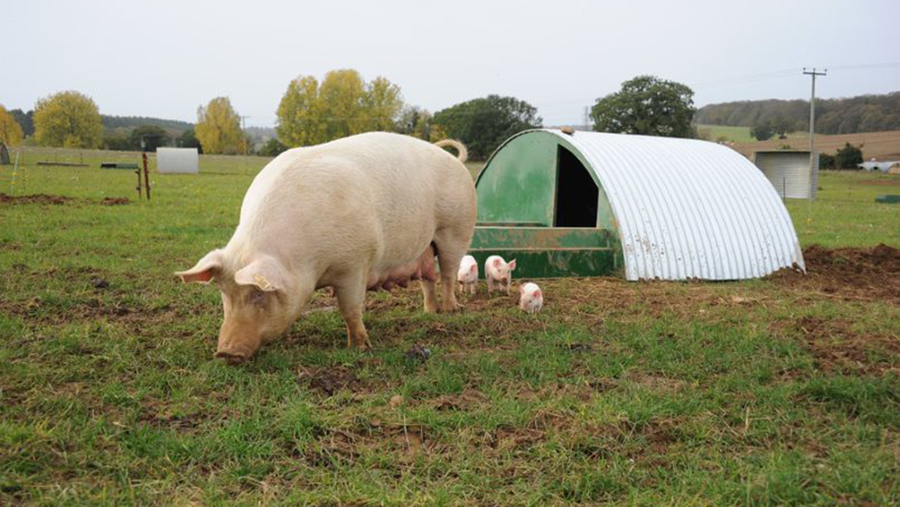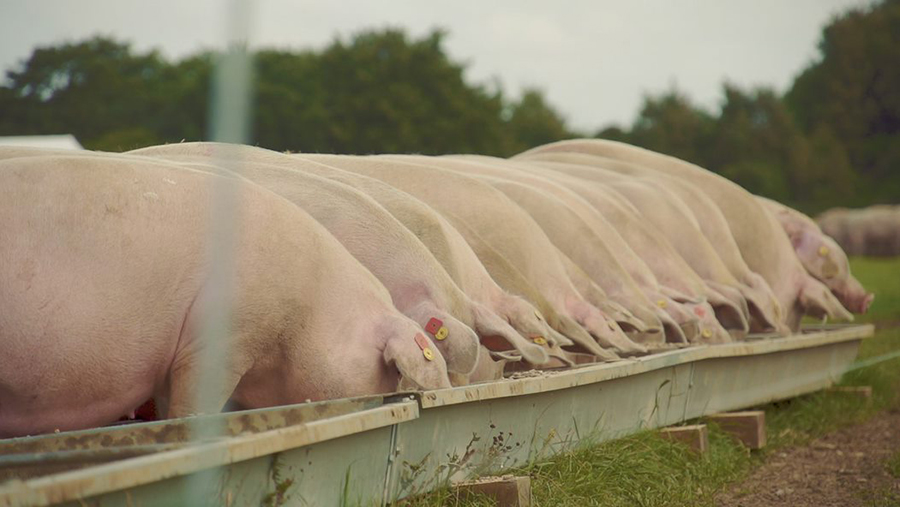Advertiser content
Sustainability and farm performance must go hand-in-hand
Barney Kay, MD – Agriculture at Pilgrim’s UK
The UK pig sector continues to face incredible challenges. A series of unprecedented factors, such as the rising cost of feed, labour shortages and a backlog of pigs on-farm, are contributing to a melting pot of difficulties for farmers and the sector at-large.
As the largest producer and processor of higher welfare pork, representing 30% of the total number of UK pigs processed in the market, we’re working closely with our farmers to get through these challenging times together.
We have all watched the incredible volatility of the raw material markets, at times with disbelief. With feed prices already at unprecedented highs at the start of the year, the Russian invasion of Ukraine led to inflation none of us have seen before.
I know from conversations both within the business and with our farmers, one can feel helpless in the face of such headwinds, so what can we do? An old boss of mine always said, control what you can and don’t worry about what you can’t.
What’s within our control?
- To improve physical performance we have made the following changes:
- We’ve switched to five-week weaning, which is leading to stronger healthier piglets that are performing better during the grower/finisher stages where the big costs are incurred.
- We’re feeding our sows in troughs, instead of spinning the feed out into the paddock to feed both the sows and the birds! We believe this saves about 8% of feed.
- Genetics – through our recent changes we are seeing reduced aggression (and therefore risk of tail biting), plus improved marbling (and therefore eating quality) whilst having great efficiency of feed as well.
- Growing accommodation. The BQP blueprint designed to be quick and easy to erect and optimise pig performance.
- Data – if you can’t measure it, you can’t improve it.
- Our sites use operational excellence techniques to help them hone into areas that will drive performance. We have recently embraced this and are being more disciplined in how we manage our KPIs and focus our energy on the ones that really drive the business – keeping it simple and practical are essential for this to be embraced.
- Feed and risk management
- One benefit of having a large international parent company is that we work very closely with their international raw material buying team.
- Through the international insight we get from the commodity team and working closely with our feed company, we continue to navigate the unprecedented volatility of these markets. That’s not to say we have access to cheap feed – no one has, but our team has been fantastic at avoiding the worst peaks.
- One of our key areas of focus is reducing our soya utilisation in the diet, which is a significant driver of the overall carbon footprint of the pig. We have the lowest level of utilisation in pig diets within Europe and our R&D farm is exploring a range of alternatives proteins that can help find alternatives and reduce this further.
The things out of our control? Well, we’ll let others worry about those and stay focused on the things we can do something about!
Five-week weaning
This was initially developed to help cope with the EU requirement to remove zinc from the diet. However we are seeing many benefits:
- An extra week with the sow gives more robust, healthy and consistent piglets.
- There are few requirements for growth checks.
- The additional week spent with the sow is more than compensated from wean to finish, with overall batch length coming down significantly.
Although a significant investment across our integrated outdoor bred operation, as all our herds gradually convert we can see the health, welfare and commercial benefit of this step change.
Environmentally responsible, sustainable pig production
I know all farmers are under so much pressure to reduce farm emissions, while increasing food production (feeding 9bn people by 2050!) and improving animal welfare – not an easy conundrum.
BQP assesses the soil of all its farms and works closely with bodies like the Rivers Trust and FWAG (Farm Animal Advisory Group) to ensure we both mitigate the environmental impact of our outdoor pigs and in most cases actually help regenerate the land and soil.
Our aim is to maintain grass cover with our sow paddocks, so farmers work closely with landlords to ensure we dovetail into their rotations, to allow time for grass to establish properly before introducing pigs.
When Defra brings in the new Environmental Land Management scheme (ELMs) in 2024, I can see more farmers recognising the value that outdoor pigs can plan in their rotation. Providing a break from short (wheat, barley, rape) rotations, helping manage challenges like blackgrass and adding valuable organic matter and nutrients to the soil.
Our pigs occupy c. 8,000 acres, part of 32,000 acres rotation – in the future the value of our black gold (pig muck) can help our landlords trade carbon for companies looking to offset their emissions, as our organic matter is locking up carbon, improving water holding capacity in the soil and reducing the amount of inorganic fertiliser needed by arable farmers – a win, win, circular and more traditional farming rotation.
Precision sow feeding
A really good example of the win, win approach described above is our investment in sow troughs on all our breeding farms.
Previously sows were fed using the “nut chucker” spreading sow rolls across the paddock – this noisy way of feeding acted like the dinner bell for wild birds, resulting in a financial impact of lost feed to birds and vermin and creating risk of salmonella contaminating the feet of the birds.
We then also realised an unintended positive environmental benefit. Pigs won’t defecate where they eat, so when fed with the nut chucker the pig toilet was concentrated around the edge of the paddock leaving high nutrient concentrations.
Now, with this new approach, manure is spread evenly across the paddock, reducing risk of leaching and improving the even spread of nutrients for the next crop.
People
It’s the people that have make BQP, as part of Pilgrim’s UK, the type of business farmers have trusted for over 40 years. I know the last year has been hard on everyone in the pig industry and this can strain even the strongest relationships.
I am so proud of our team, whether out in the field with our farmers or in the office who have worked so hard during the last year with such professionalism and integrity.
We are trying to ensure we support all those we work with directly, or indirectly, making subjects like mental health something people feel comfortable talking about and know where they can get help and support.
We feel we have so much to be proud of as a British pig industry and we need to be more confident in supporting our customers to tell that story directly to consumers, helping them to understand the pride our people have in rearing the highest welfare, quality pigs for families across the UK.
Provided by
Pilgrim’s UK is Britain’s biggest higher welfare pig farmer and producer of sustainably produced quality pork products. A division of Pilgrim’s UK Corporation, our business is part of the second largest food company in the world, whose team farm, process, prepare, package and deliver fresh, frozen and value-added food products for sale in more than 100 countries.
Our sustainability effort is guided by our vision to become the best and most respected company in our industry, creating the opportunity of a better future for our team members.
Pilgrim’s UK 2030 is our way of saying sustainability guides everything we do. It combines our vision, focus and targets as we take on the three big challenges of our time. Our business is already strong, but we want to go much further. Our progress is being built on five core pillars: Sustainable farming; sustainable food production; sustainable packaging; sustainable business and community; sustainable products.
Find out more at pilgrimsuk.com/sustainability


